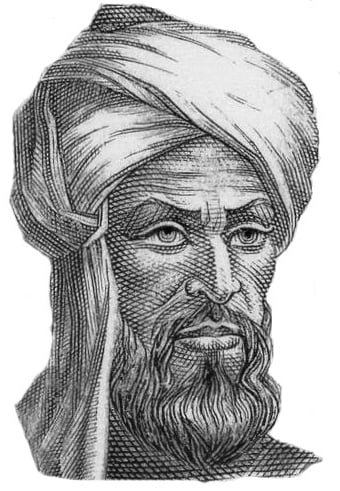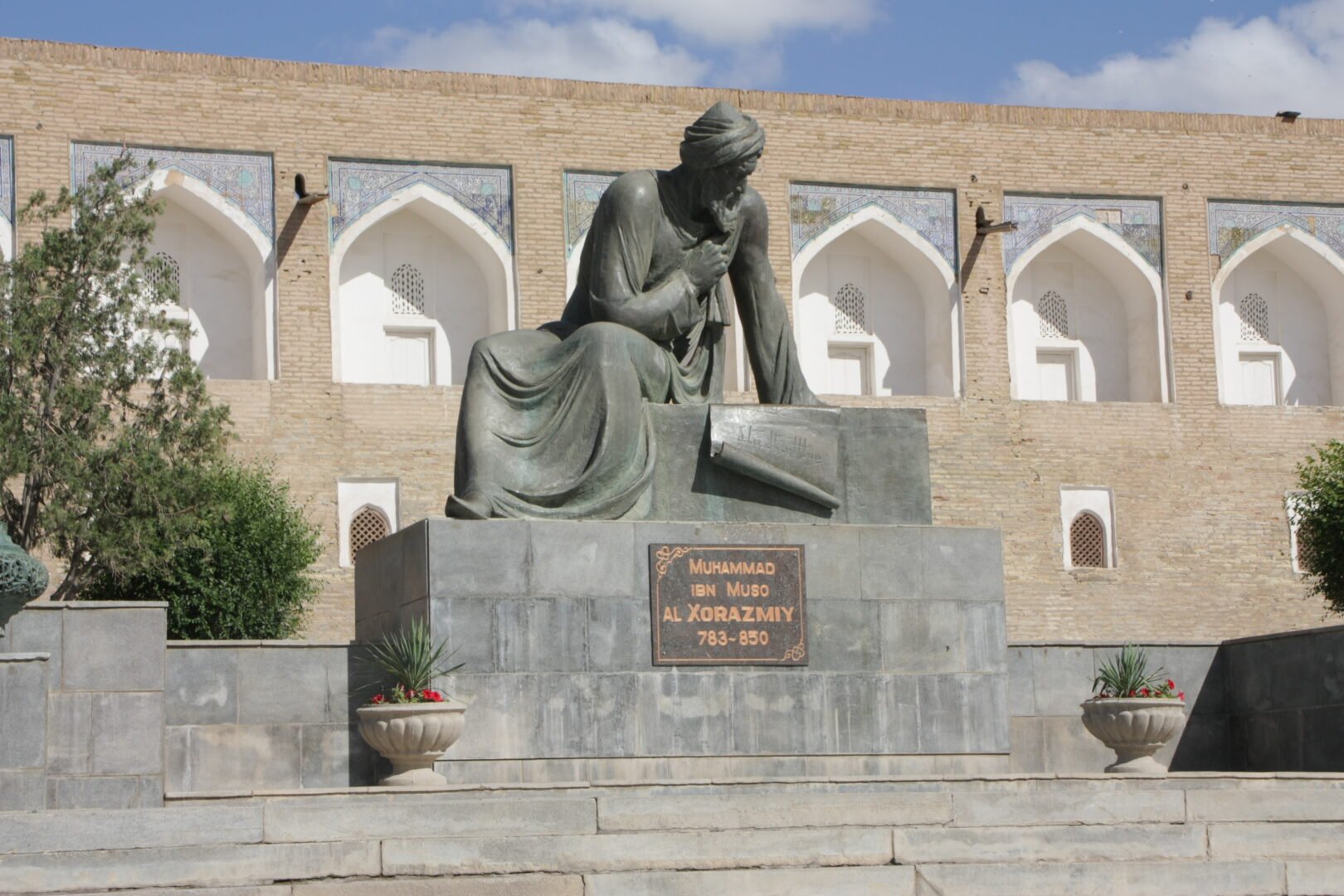A Brief Biography of Al-Khwarizmi
Abu Jafar Muhammad ibn Musa al-Khwarizmi, also famously known as Al-Khwarizmi in the world of science, was born in Persia around c.780. There are such tiny accounts of his early life that even his birthplace is doubtful. It is deduced from his last name, “Al-Khwarizmi,” that he was a native of Khwarazm, which was a part of Greater Persia at that time but now is a part of Uzbekistan and Turkmenistan; so many historians believe that his upbringing was in that area of Persia. However, it is also thought by some people that he was possibly born in the Baghdad area of Iraq.

Since there is no consensus among the historians, it is also said that he was born in modern-day central Asia and spent his adulthood in Baghdad. He was born during the time period when Harun al-Rasid was ruling as the fifth caliph of the Abbasid Dynasty. The Caliph, during his rule, made efforts to bring some of the scholarly subjects to be studied that were least pondered upon in the Muslim world. After the death of the Caliph, his son continued the efforts and established the “Bayt-al-Hikmah,” also known as the House of Wisdom, an academy for learning, in the heart of Baghdad.
Al-Khwarizmi, during his adulthood, became a student of this prestigious learning hub. Since this academy had translated scientific and philosophical work from all over the world, especially Greek work, and had built observatories for astronomers, Al-Khwarizmi acquired vast knowledge in various subjects from this academy. Later on, he became a working member of the “House of Wisdom” in Baghdad under the support of Mamun ar Rashid.
Initially, he translated Greek scientific work into Arabic, but later he wrote many books of his own. Al-Khwarizmi, as the world knows him today, has many significant contributions in the areas of mathematics, astronomy, astrology, and geography.
The Founder of Algebra
Due to his noteworthy contribution to the field of mathematics, he rightfully earned the title of “Father of Algebra.” The word “algebra” came from the word “l-Jabr,” which was not only the title of the book he wrote, “Al-Kitab al mukhtasar fi hisab al-Jabr wa’l Muqabala,” but also one of the two operations that are used to solve the quadratic equations as mentioned in the book. This book is considered a rudimentary manual of modern-day algebra.

He wrote this book to make mathematical calculations easy and simple that would have practical use in the daily lives of the Muslims at that time. The Muslim mathematician introduced natural numbers in his book and wrote systematic solutions for linear and quadratic equations. In short, this book provided extensive knowledge regarding the solution for the positive roots of polynomial equations.
The methods of “reduction” and “balancing” were also described, explaining how either side of the equation can be balanced. Then, he applied this knowledge to demonstrate some practical examples, like finding the areas of figures like cones, circles, etc., which is where he laid the foundations of trigonometry. The last part of his book dealt with inheritance principles in Islam, which was translated into Latin in the 12th century.
Moreover, he is famous for his work on the concept of algorithms. In fact, the word algorithm is derived from the word “algoritmi” which is the Latinized version of the name Al-Khwarizmi. His second famous book, which is preserved in its Latin translation, “Algoritmi di numero Indorum,” popularized Hindu-Arabic numerals so much so that they were adopted by the West some centuries later. He provided algorithms to solve complex equations. Algorithms now serve as the basis of computing systems even today.
Geography
In the field of geography, Al-Khwarizmi’s books also play a very vital role. He wrote “Kitab Surat al-Ard,” which translates to “The Shape of the Earth.” In this book, he corrected the findings of Ptolemy. Using Ptolemy’s data, he drew accurate maps and gave a list of longitudes, latitudes, rivers, cities, mountains, seas, islands, and other geographical regions in this book.
He presented an improved estimated length of the Mediterranean Sea and additionally assisted the caliph and other geographers in constructing a world map. Through his research, he also tried to find the circumference of the Earth. Although the maps and diagrams in the original manuscript of his book were not preserved, scientists were able to redraw them using the descriptions provided in his book. His work opened doors to significant research in the field of geography.
Astrological and Astronomical Contributions
While his major contributions were in the fields of mathematics and geography, Al-Khwarizmi also made some minor contributions in subjects of astrology and astronomy. His book, called “Zij as-SindHind,” was based on the work of other Greek and Hindu researchers of that time. In this book, he compiled astronomical tables; therefore, this book provided the first Islamic astronomical calculation table in the Indian civilization and played a pivotal role in further astronomical calculations in Indian civilization.
Furthermore, his work on sundials and astrolabe was also included in this book. He made improvements in the previous work done on the sundial and made his sundial universal, meaning that it could be observed anywhere from the Earth. His reconstruction of the sundial was a success because it was then placed in mosques to determine prayer timings. Therefore, by observing the sun and the stars, he successfully developed the first quadrant to determine time.
Al-Khwarizmi has as many as almost twenty astronomical works accredited to him. He also studied and wrote about topics including calendars, tables of sines for a circle with a radius of 150 units and tangents, spherical astronomy, eclipse calculations, and the position of the moon, stars, and the sun.
He worked on the Jewish calendar and determined on what day certain events fell on the calendar. Using the same Jewish calendar, he also determined the rules to measure the longitude of the sun and the moon. It is also said that he wrote a political history that mentioned horoscopes of famous political personalities. The original book Zij as-SindHind, which was in Arabic, was not preserved; however, the Latin translation of this book has been well preserved.
Impact of Al-Khwarizmi’s Work on Modern-day Science
Al-Khwarizmi’s work revolutionized the world of science. It was due to his work that many new fields like engineering, optics, finance, computing, etc., emerged in the later centuries. His major contribution was in mathematics, where algebra is not only a vital part of calculations but also taught in schools in basic math courses, although after undergoing tons of modifications. It was because of the work of scholars like Al-Khwarizmi that intellectuals like Newton were able to provide further advancements in the field of physics.

His work, along with other scholars of that time, in astronomy and astrology served as a stepping stone to reach the height of advancements in outer space that we see today. His calculations regarding sundials helped to develop modern-day watches. The concept of algorithm, which was a key work of Al-Khwarizmi, is now understood by many as a social media algorithm. Algorithms are now responsible for a lot of things, like search engines.
Conclusion
After providing the world with colossal and impactful knowledge, the Persian Muslim scholar passed away in c. 850 in Baghdad, Iraq. His work was not limited to the Muslim world and was translated and preserved in other languages as well. His work influenced Western researchers so much, changing the outlook of the modern world. Although through algorithms the world is being exploited now, his legacy continues to live on in every problem that is solved by the computer.
If you want to submit your articles and/or research papers, please check the Submissions page.
The views and opinions expressed in this article/paper are the author’s own and do not necessarily reflect the editorial position of Paradigm Shift.
Hareem Amna graduated with a degree in applied psychology from GCUF and a post-graduation certification in clinical psychology from Kinnaird College. She is an aspiring writer focused on writing about current issues.


